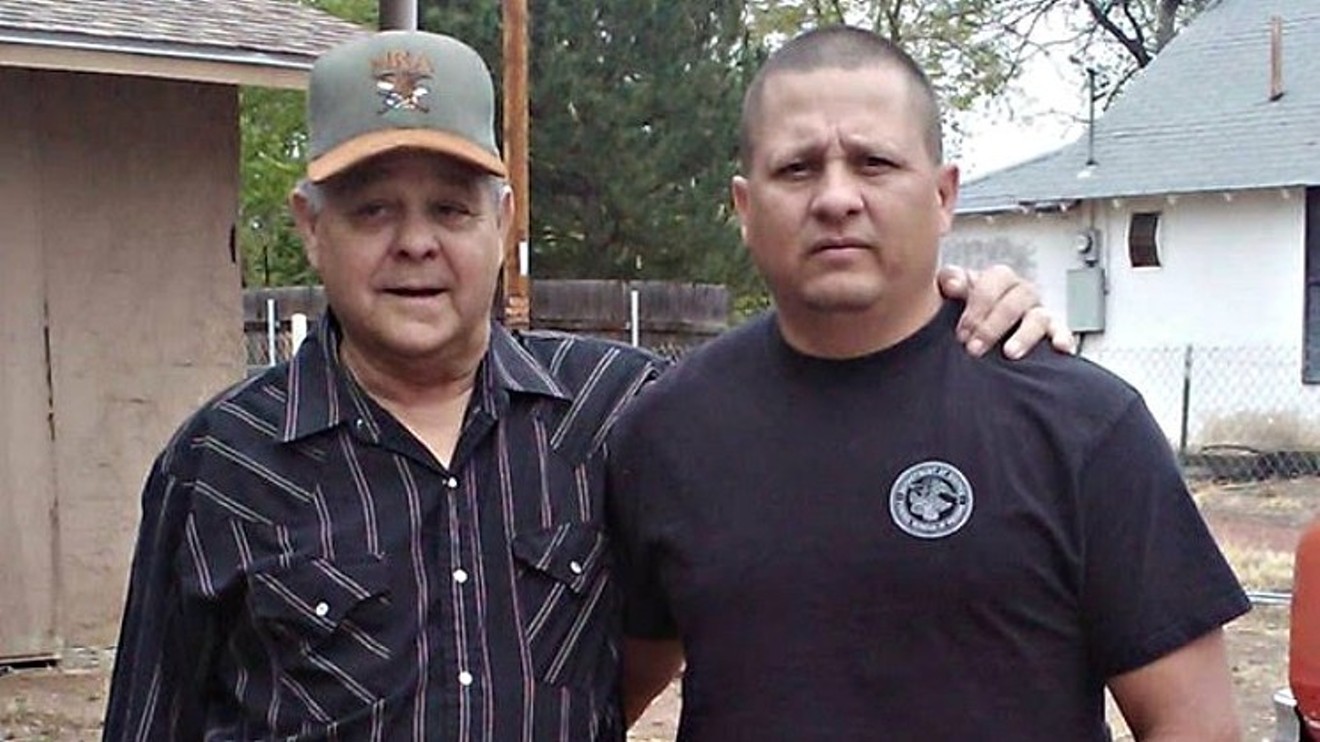Later that year, the Colorado General Assembly passed a law intended to curtail operations like Sunset Mesa. But in the wake of multiple lawsuits aimed at Hess, who hasn't responded to multiple inquiries from Westword over the years, and a litany of horror stories from surviving victims appalled by what happened, Representative Matt Soper is taking even more direct action against such abuse by way of legislation that would define what authorities believe happened at Sunset Mesa as abuse of a corpse and raise the crime from a misdemeanor to a felony.
"Whether it's organized, like what Megan Hess was doing, or it was a one-off crime, abusing a corpse shouldn't be a misdemeanor-level offense," says Soper, a Republican from the Western Slope. "It's just an egregious act."
Bobby Espinoza agrees. He told Westword about the trauma he and other relatives suffered after learning that his late father, Jerry Espinoza Sr., who'd been assigned to Sunset Mesa for care, had been dismembered and sold for parts; Jerry's head and legs were carved from his body and his torso and pelvis severed prior to their distribution to three different purchasers.
The case isn't unique: Westword obtained a human body parts price list from Biological Resource Center Inc., a now-defunct Arizona business that charged $200 for an elbow, $400 for a whole arm and shoulder, $3,300 for a torso with attached head (referred to as a "cephalus") and $5,000 for an intact corpse. But the Montrose case directly inspired Colorado's Human Remains Disposition Sale Businesses Act, which forbids a person from owning more than 10 percent indirect interest in a funeral home or crematory while simultaneously owning interest in what's termed a "non-transplant tissue bank" — i.e., a body broker. It also requires such tissue banks to register with state regulators and keep records that are available to interested parties, among other things.

An investigator outside the Sunset Mesa funeral home in Montrose.
CBS4 via YouTube
After Soper took office last year, "I kicked around various ideas, but none of them seemed to do what I wanted them to do." Prior to this session, however, he took a closer look at the two Colorado statutes focused on abuse of a corpse. The first defines a violator as anyone who "removes the body or remains of any person from a grave or other place of sepulcher without the consent of the person who has the right to dispose of the remains" or who "treats the body or remains of any person in a way that would outrage normal family sensibilities" — a passage that encompasses necrophilia. But the offense is deemed just a Class 2 misdemeanor, which carries a maximum penalty of 364 days in jail and a $1,000 fine. As for the second statute, "Tampering With a Deceased Human Body," it's a felony 3 punishable by four to twelve years in prison and a fine between $3,000 and $750,000. But it's narrowly focused on abusing a corpse to conceal evidence of a separate crime.
This last measure was originally shepherded by Senator Rhonda Fields, who told Soper she hadn't broadened the bill in part because of economics. "Whenever you create a new felony, there's a fiscal note that attaches to it, and the fiscal analyst will look at how many people it might apply to and how much it would cost," he explains. "The analyst assumes the full cost of going to trial and how some of the cases could be appealed, and that really takes the costs up, especially in a tight budget year."
Turns out, though, the law hasn't been used very often. According to Soper, "I asked how many of these offenses were actually charged over the last five years and discovered it was thirty, a very low number. The few tens of thousands of dollars for prosecuting a felony is pennies compared to everything else in a $32 billion budget."
With that in mind, Soper crafted House Bill 20-1148, accessible below, which makes abuse of a corpse a Class 6 felony, marked by a sentencing range of one year to eighteen months in prison and a $1,000-$100,000 fine. He also came to a compromise with the Colorado Criminal Defense Bar, which routinely opposes punishment increases, by writing into the text a proviso that individuals couldn't be charged with both corpse-abuse violations for a single incident. In exchange, the CCDB has agreed to remain neutral on the bill.
Fields, a Democrat, has signed up as a co-sponsor of the legislation along with Senator Bob Gardner, a Republican from El Paso County. As such, Soper notes, "I'm not sensing a partisan fight here at all. It's been assigned to the House Judiciary Committee, and I have a sense it will have bipartisan support, since this is such a horrible act."
Click to read House Bill 20-1148.












